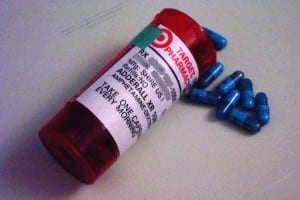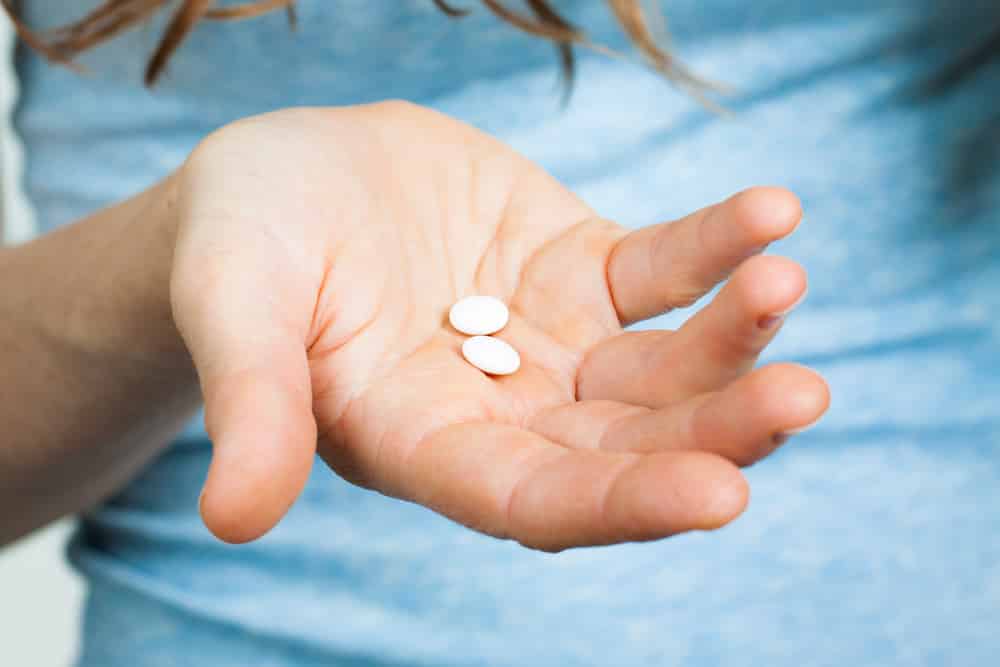ADHD prescription drug abuse is on the rise. Has been for more than a decade. A study presented May 3, at the annual meeting of the Pediatric Academic Societies (PAS) in Vancouver, British Columbia, Canada, found that not quite one in five students at an Ivy League college said they’d abused prescription medication while studying and one-third of the study participants didn’t consider this type of drug use to be cheating.
But college kids aren’t the only ones hitting prescription stimulants for an, er, off-label use. Adderall, a mix of amphetamines currently ranking as the top ADHD treatment, has seen a tremendous rise in use in women over 26. In 2002, only 800,000 women reported Adderall use. By 2010, 5.4 million women in this age group were using the drug. In particular, the number of Adderall prescriptions for women aged 26-39, rose by 750% during this time period.
College students call Adderall, “college crack” or “cognitive steroid” while suburban moms, mimicking Felicity Huffman of Desperate Housewives, call it, “Mother’s Little Helper.” Students use the drugs in hopes of improving their grades. Moms use it to combat fatigue and get things done.
But if they were truthful, both groups would admit the stimulant makes them feel good. Which is a large part of the attraction. Which makes these drugs, yes. Addictive.
There are a number of problems with such misuse of prescription drugs. For example, the way in which such drugs are obtained. In general, students facing exams, and burnt out bored housewives have two options for getting the drug:
- Fake out a doctor so as to convince him to write out a prescription
- Buy the drug from someone with a valid prescription for the medication
Let’s take a look at these two methods for obtaining prescription medication, shall we? What do you think of a doctor that is so easily fooled into thinking a student or a suburban housewife has ADHD at a level serious enough to require prescription stimulants? Would you want such a doctor treating your family members? Furthermore, isn’t it just a bit suspicious that such large numbers of people are able to cadge ADHD prescriptions from MD’s?
What’s up with that? Why is there no watchdog group paying attention? And wouldn’t you think that at the very least, someone would sue some of these physicians for malpractice?
Maybe it’s a cultural thing. We think nothing, for instance, of imbibing strong cups of coffee for the caffeine they contain to keep us alert to cram for an exam or have a glass of wine to steady our nerves in social situations. Why should the abuse of a drug given, after all, to children, cause us any special qualms?
As for the second method of getting the drug, we’re talking about kids selling off their prescription drugs without the knowledge of their parents or doctors. And guess what? It’s a class II drug, in the same category as, for instance, COCAINE. How does the court look at this? Depending on the state and the circumstances, selling ADHD medication is a felony. In fact, trading the medication or even just giving it away, may be viewed as a felony.
In his concluding remarks regarding the Vancouver study, senior investigator Andrew Adesman, MD, FAAP, chief of developmental and behavioral pediatrics at Steven & Alexandra Cohen Children’s Medical Center of New York said, “To the extent that some high school and college students have reported feigning ADHD symptoms to obtain stimulant medication, should physicians become more cautious or conservative when newly diagnosing ADHD in teens? Additionally, should pediatricians do more to educate their ADHD patients about the health consequences of misuse and the legal consequences that could arise if they sell or give away their stimulant medication?
All things considered and aside from the fact that the child is not using the medication deemed necessary by his doctor for his academic success, selling that medication to others makes him complicit in a criminal act.
It can also make him rich. During college exam period, a kid might be able to sell a single Adderall pill for $20 whereas, the usual going price is just $5. Students under stress are willing to pay for whatever they think will get them through crunch time.
While college students and young mothers are the two main groups identified as misusing medication for ADHD, the National Institute on Drug Abuse spoke of a “cause for alarm,” the abuse of prescription stimulants by high school students. A survey performed by this institute of 45,000 students found that such abuse increased among senior high school students from 6.6-8.2% from 2010-2012. Could there be a trickle-down effect in play here? Big brother at college uses it, Mom uses it, why shouldn’t I?
In 2012, there was a market shortage of ADHD medication which had moms scrambling to find sources to medicate their children, who really do need the medication to cope with schoolwork. Drug companies blamed the shortfall on government quotas levied on psychoactive ingredients by the U.S. Drug Enforcement Administration (DEA). The quotas are meant to help control abuse of these drugs. Meantime, DEA officials blamed drug firms for manufacturing more of the name brand medications and less of the more inexpensive generic versions of these drugs. It’s simply more lucrative to sell the name brands.
Dramatic Surge In ADHD Prescription Drug Abuse
The National Institute on Drug Abuse, however, laid the blame squarely in the laps of women of childbearing age who have seen a dramatic surge in both the use and abuse of these drugs. Why not? It’s a feel-good drug. Experts say the drugs improve the brain’s utilization of dopamine, everybody’s favorite neurotransmitter. When crushed and snorted, the drugs give the use a rush comparable to that of cocaine.
Habit forming? You betcha. Wondering about side effects? For sure. The following side effects have been observed with medication for ADHD, such as Adderall:
- Seizures
- Paranoia
- Aggressive behavior
- Tics
- Cardiac arrest (in those with preexisting heart problems)
Nonetheless, a 28 year-old Utah woman, Sunny Morrisette, heard “good things about Adderall and wanted to try it.” She traded cigarettes to school kids for their drugs. And got caught. Morisette was charged with several counts of felony drug offenses as well as contributing to the delinquency of a minor. During her initial hearing she admitted she’d traded cigarettes for drugs at least 10 times with the kids in her neighborhood.
College students say they use the drugs to study, but in truth, they’re also using Adderall to party, lose weight, and  chug down more beer without falling asleep.
chug down more beer without falling asleep.
Meantime, a University of Pennsylvania study found that drugs for ADHD don’t improve cognition in children with ADHD. In other words, the meds don’t improve their grades. So what gives? Why does there continue to be such a huge market both for the drug as it is meant to be used and for its abuse?
Well, it’s like this. The medication, in and of itself, doesn’t solve the problem of academic failure to thrive. Only study does that.
Gotta Study, Period
So if you take Adderall, Ritalin, Concerta, or any other ADHD drug, but you fail to study, fuggeddaboutit. Your grades will go bust. And we’re not talking about last minute cramming. We’re talking about serious study, sustained over a lengthy period of time, on a regular schedule.
The meds help with focus, concentration, and with controlling impulsivity, but it’s like leading the horse to water: just as you can’t make the horse drink, you can offer the optimal environment—in this case for study—but you can’t force the student to put his nose to the academic grindstone.
In any event, the medication, even under optimal circumstances, with a motivated student that is willing to study, must be accompanied by lessons in time management and organization. Those with ADHD have difficulty with executive functions. They find it difficult to plan, prioritize, and execute everyday activities, such as academic study. As a result, a student on medication for ADHD, may find it easier to concentrate, but end up using her focus to have a deep discussion with a classmate while another student might suddenly “come to” and realize he’s been madly cleaning his room instead of studying for that French test.
Exaggerated Sense Of Productivity
Meantime, a small University of Pennsylvania study found that the drugs don’t contribute to the academic success of college students who abuse them in such large quantities. What they did find instead, is that the drugs give these students an exaggerated sense of productivity, due to the more efficient use of dopamine. One college senior remarked, “Of course, I could have studied in college without Adderall, just like I did in high school — I just couldn’t have studied with such ecstasy.”
